
Women and children are disproportionately affected by natural disaster and war - pregnant women face dangerous deliveries and, in unprotected refugee settlements, rape, trafficking and gender-based violence increase. IPPF delivers essential lifesaving services for women, men and children in times of crisis.
Articles by Emergencies

"I’m so happy I now don’t have to worry about contraception for another five years”
In August 2017, weeks of continued and heavy rainfall across Nepal resulted in flash floods and landslides that affected 36 of the 75 districts. Many people lost their homes or were displaced. It was estimated that of those affected, 112,500 were women of reproductive age, including 8,694 pregnant women. IPPF Humanitarian, through their Member Association, The Family Planning Association of Nepal (FPAN), activated its emergency response system early on. With funding support from the Australian Government, FPAN and IPPF Humanitarian initially mobilised their response in four of the worst affected districts (Sunsari, Saptari, Bardiya, and Dang). Mobile medical camps were established to meet the sexual and reproductive health needs of the affected population, including through the distribution of short and long acting methods of contraception, STI and HIV screening, and GBV referrals. In collaboration with the USAID-SIFPO project, services were then expanded into five more affected districts. IPPF Humanitarian spoke with 21-year old Muna in her home district of Sunsari in Nepal. “I got married at 16 years old and have two children, a four-year-old girl and two-year-old boy. In my caste, we get married early, so my parents took me to get an arranged marriage. I was in the 8th class at the time, and returned to school after I got married, but only lasted one year. My husband works in construction and had to stop working for two weeks when the floods came. When he doesn’t work, he doesn’t get paid, so it’s been very difficult. A FPAN social worker told me about the mobile medical camp today. I used to be on the three-month injectable but today I changed to the five-year implant in my arm. When my youngest child was eight months old I found out I was pregnant again. I decided to discontinue that pregnancy, so I took the five small tablets given to me by my neighbourhood doctor. I was two months pregnant at the time. From this, I had two days bleeding and cramp like pain, and then weakness. I decided to abort that pregnancy because my youngest will still only eight months old, and I didn’t want any more children. If I had more than two children, it would be very difficult to feed and educate them, and would badly affect my body too. I’m so happy I now don’t have to worry about contraception for another five years.” Want to know more about safe abortion access? Join IPPF'S I Decide movement
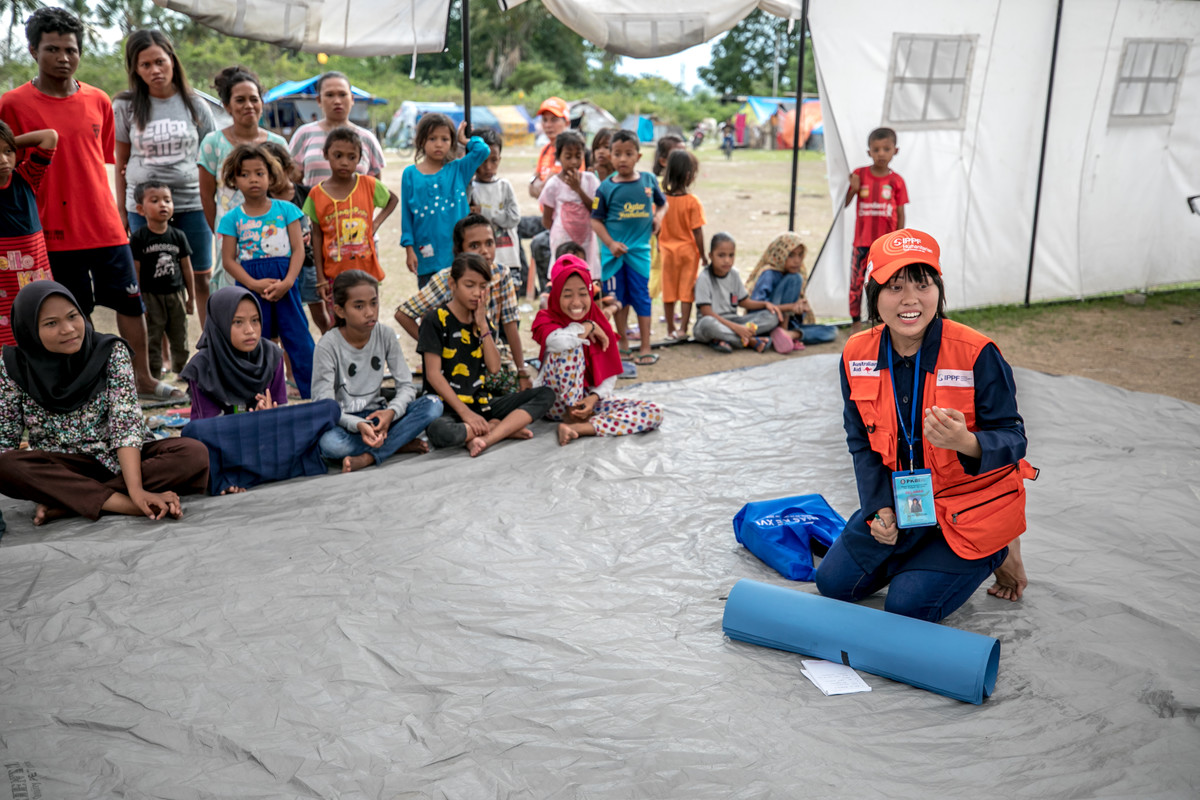
Indonesia: Youth volunteerism in the aftermath of a triple disaster
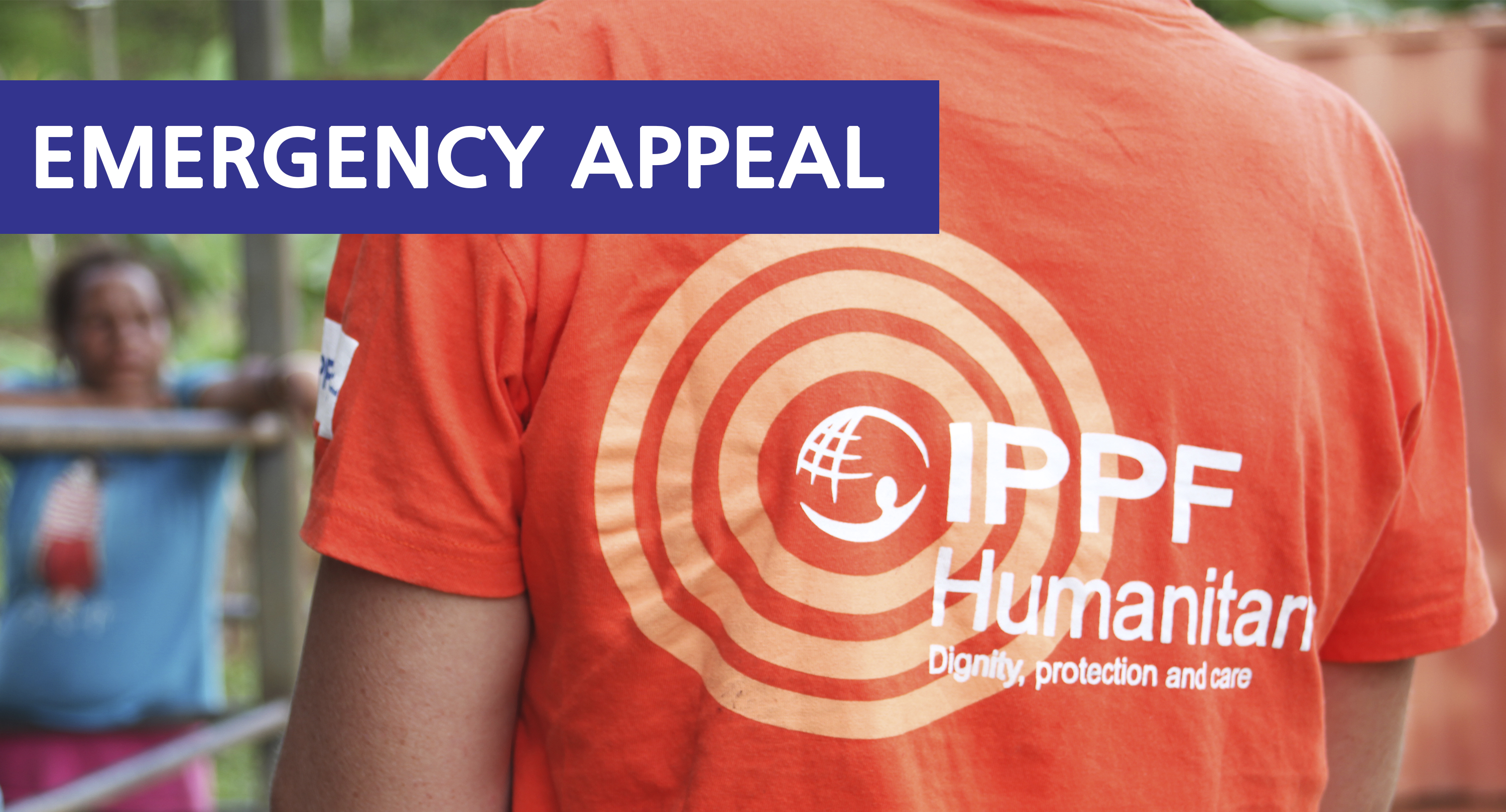
Emergency appeal for the earthquake and tsunami in Indonesia
Updated 18 October 2018 We are continuing our response to the earthquake and tsunami of 28 September through our local partner the Indonesia Planned Parenthood Association. The latest death tolls stands at over 2,100 people and sadly, is expected to rise. Our response team remains on the ground and our supplies have started to arrive, such as much needed contraceptives and mobile sexual and reproductive tents. Our response During all emergencies, women and marginalised groups are the most vulnerable. In the coming days, and weeks, we will continue to expand our reach to the 78,994 people still displaced by this double disaster with clinical services such as prenatal care, STI and HIV screenings, contraceptive provision and gender based violence screening. Our team from the Indonesia Planned Parenthood Association has been operating locally since 1957 so is well placed to respond to the needs to the local population and work closely with the Indonesia Government in their response efforts. Our emergency appeal Our emergency fund will allow us to reach more people with these much needed, and overlooked, services. 100 percent of the donations made to this fund will go directly to our partner the Indonesia Planned Parenthood Association to allow them to continue their services. Please donate now. Donate now Our Member Association, the Indonesia Planned Parenthood Association (IPPA) has an office and clinic in Palu City and is currently sending additional support from other IPPA offices to Palu. As well as undertaking initial assessments of the urgent SRH needs, the team will distribute prepositioned hygiene kits to affected communities. IPPA has also sent their medical doctor from Makassar to the field as part of a joint outreach team with the Indonesian Government health response team. Satyawanti Mashudi, Executive Director of IPPA, says: "Indonesia has been rocked by a series of natural disasters lately, but Friday’s earthquake and tsunami double disaster has caused a catastrophic amount of destruction and loss of life. We are grateful that all our local staff have been safely accounted for, and now our attention must go towards the affected communities and their sexual and reproductive health needs. With tens of thousands of people sleeping in temporary shelters, and many more displaced, we know from experience the SRH needs will be high, and urgent." With a total population of 1.5 million in affected areas, we know that as many as 375,000 of those are women of reproductive age, 300,000 are sexually active men and as many as 27,225 women could be pregnant. It is crucial we can reach these populations during the initial days and weeks after the disaster to provide life-saving SRH care. Donate now
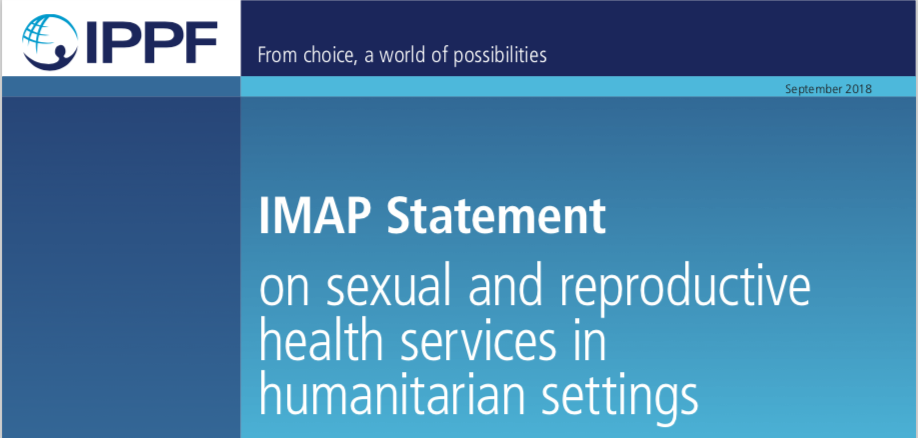
IMAP statement on sexual and reproductive health in Humanitarian settings
Today, unprecedented numbers of people are living in a state of crisis or emergency. In 2018, it is estimated that 135.7 million people are in need of humanitarian assistance, with conflict and natural disasters predicted to be the biggest drivers. Of those in need, approximately one-quarter is estimated to be women and girls of reproductive age (aged 15–49) and approximately 5 million will be pregnant. Globally, 60% of preventable maternal deaths take place in settings of conflict, fragility, displacement and natural disasters.
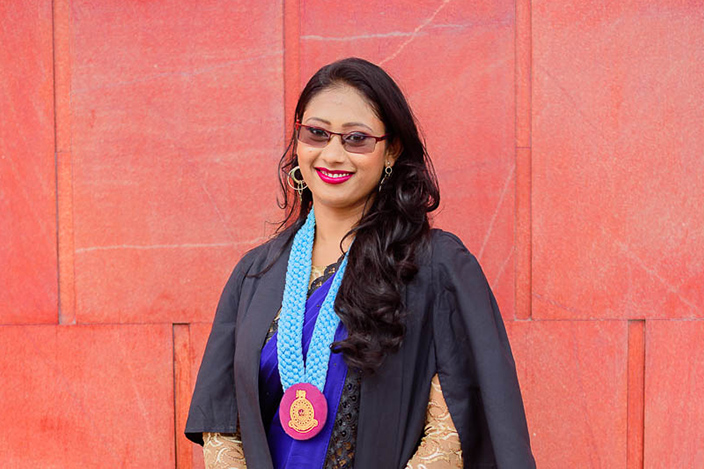
Inspiring young people like Chathurika play a crucial role in crisis response
In May 2017, flash flooding in Sri Lanka triggered landslides resulting in many people losing their homes, forcing them to seek shelter in camps. IPPF’s member association the Family Planning Association of Sri Lanka (FPASL) assisted those affected and provided health camps with the support of IPPF Humanitarian. Chathurika Jayalath, a youth volunteer for FPASL, took part in the response. Chathurika is a 24-year-old student from Kegalle, a large town about 80 km from Colombo, and she has been working with FPASL for the last three years. She started out as a youth volunteer and recently became a member of the Youth Technical Advisory Committee. During her engagement with FPASL, Chathurika has learned about sexual and reproductive health and rights (SRHR) and gender issues and has organized workshops on similar topics in her own community. In fact, she runs a youth club at her university to inform her peers about SRHR. Shortly after the floods began, Chathurika received a WhatsApp message from FPASL where they called for youth volunteers to take part in the response. “I wanted to volunteer during the response,” Chathurika told us. “As a university student I didn’t have money to donate so I figured I could contribute with my strength instead. I volunteered in the health camp. There, I assisted the medical staff with basic things such mobilizing affected people, making sure they queued up when seeking health care and packed medicine.” Ongoing SRHR needs, even in a crisis Chathurika is keen to learn more about humanitarian work. She received training with FPASL on the needs of people in humanitarian settings in which she and other trainees were presented with different case studies. “There was particularly one story that struck me. We were told that when the flash floods came, women fled without anything, they fled with the only pair of clothes they were wearing,” recalls Chathurika. “When they reached the camp, they received donated water and food. Some of them got their period while living in the camp. They did not have any sanitary pads nor additional cloths. Some of them even fled without underwear. This story made me realize that people’s SRHR needs don’t disappear just because there is a crisis.” Youth empowerment is important to Chathurika and she would like to continue this work while learning more about development and humanitarian work. She is a firm believer “that young people can contribute. Through my own experience I have seen that it is possible.”
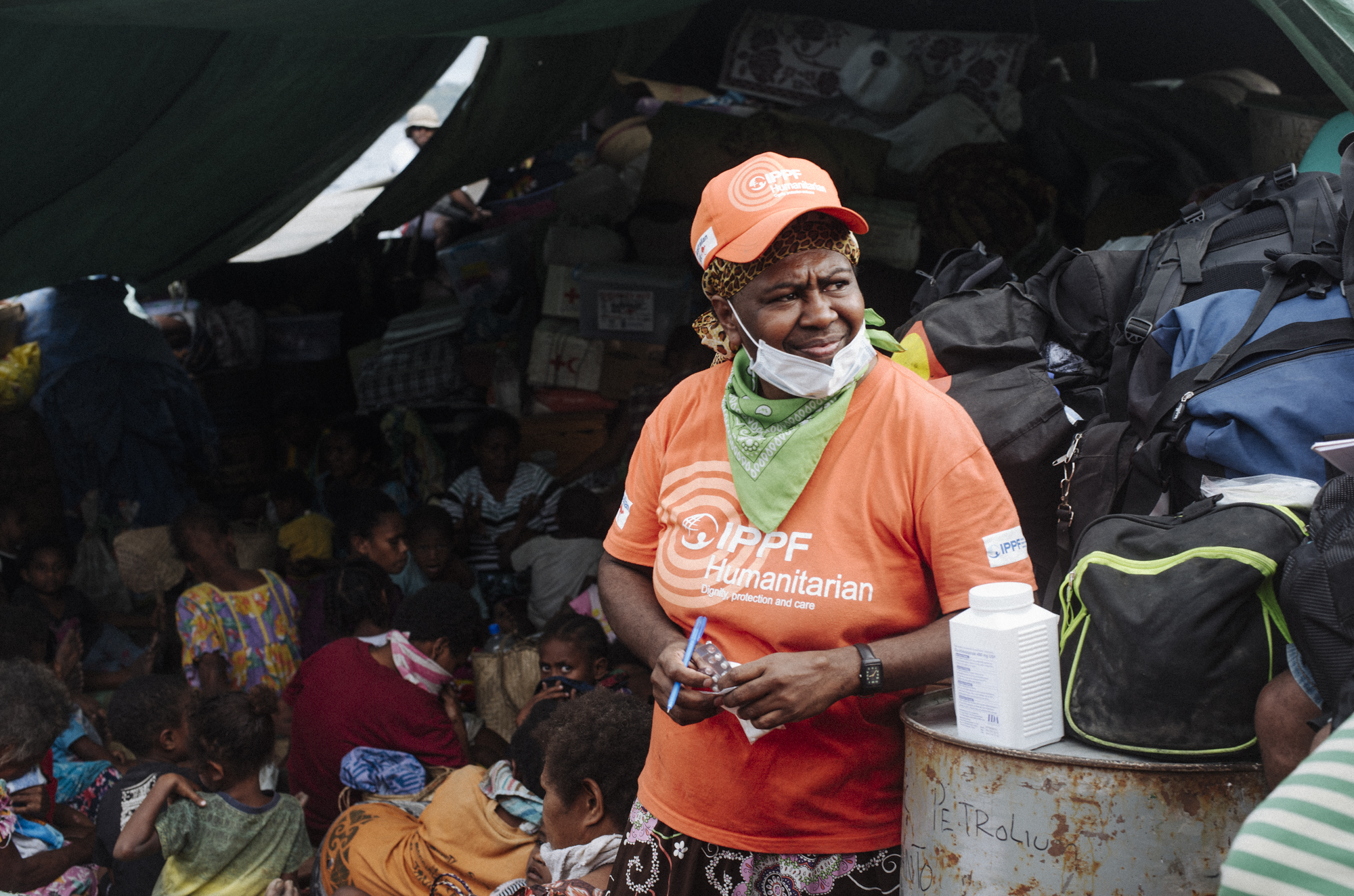
World Humanitarian Day: The view from Vanuatu
In the ten months since the Monaro Volcano on the tiny island of Ambae, in Vanuatu, became active, every conceivable surface on the island has been covered by a thick layer of ash. Volcanic ash is acidic, so it severely affects the crops many people rely on for their daily sustenance. The air becomes thick, making breathing labored and difficult. The water becomes contaminated, making it undrinkable. The first temporary evacuation, back in September last year, relocated residents to a nearby island for one month. Only a few months after they returned the volcanic activity worsened again, and a few weeks ago, the government declared another mandatory evacuation. Uncertain futures on the island IPPF’s partner on the ground, the Vanuatu Family Health Association, was on Ambae delivering emergency sexual and reproductive healthcare to evacuees during this time. This is their second humanitarian response to the island, having previously responded late last year. Find out more about sexual health during humanitarian crises Having to relocate both internally and externally, living in evacuation centres, and an uncertain future all impact the sexual and reproductive health needs of a population. On Ambae, many women reported wanting to stop or delay their pregnancies until their futures were more certain. Other women reported feeling less safe in general due to there being less people on the island. Our humanitarian response team conducted mobile health clinics on Ambae, providing much-needed contraception and other sexual and reproductive health services. Humanitarian workers going above & beyond Of the 11,500 original inhabitants of Ambae, thousands of people remained in their coastal homes or evacuation centres, and 4,000 people had registered to be relocated to nearby Maewo Island by the government. Our team travelled with the evacuees on the ship, even providing impromptu medical care en route. Now they are on their “second home” on Maewo, our teams will continue their outreach to the thousands of new arrivals. Our humanitarian workers are truly amazing and will do what it takes to provide services to people in need. On remote Pacific islands, this often means travelling by small plane, boat, vehicle and foot, all the time with the medical supplies. Once the team arrive at a community, they set up mobile health clinics in classrooms or community halls, and deliver education sessions under trees. This week, in the lead up to World Humanitarian Day on the 19 August, we want to thank our teams on the ground who go above and beyond. Stories from Ambae’s women IPPF spoke to some of the outgoing residents of Ambae Island to find out about some of the health challenges they were facing as they left their homes. Rosina, a 29-year-old mum of five, is one of them: "Five children is enough. I have never used family planning, but I know about it. I want to take it but my husband refuses to let me take the pill or the five-year stick. He says if I go on family planning then maybe I will go see other men instead of him. Many men on this island are like that. They need to be educated." "When my husband and I discuss family planning, he disagrees. He says I know once you are on the pill or take other injectables you won’t think of me as your husband. I tell him, ‘but I am young, and I want to protect me. Then I can care for our kids, look after them properly’. I don’t know how to convince him. It’s really hard." 19-year-old Annie is pregnant with her first child: "We planned for this baby. I always wanted to have a baby. I feel good to have a baby, I’m excited. My husband is excited too." "I know what family planning is. I have heard of the pill and other methods. My grandfather told me that you [the Vanuatu Family Health Association] were here today. I haven’t received any antenatal care yet, but I knew I was pregnant. A nurse checked my baby, and she said the baby is healthy. She gave me some medication for the baby. Seeing the clinic today has saved me time. The volcano makes me feel bad, it’s scary. I want to leave Ambae... It’s much harder being pregnant now. I want my baby to have a good future." Providing sexual and reproductive healthcare during emergencies is vital – find out why.

Preparing emergency outreach teams in Tonga after Cyclone Gita
In February 2018, Tropical Cyclone Gita hit Tonga – the strongest storm in 60 years. This blog was written in its immediate aftermath. In a crowded classroom on a Saturday morning in February, almost 50 reproductive health nurses gather to learn about detecting and responding to gender-based violence (GBV) in emergencies. It’s hard to fathom that only days ago, their tiny island Kingdom of Tonga was ravaged by Tropical Cyclone Gita. But they are here, and keen to learn. They will all be part of various emergency outreach teams in Tonga; including the response by IPPF member the Tonga Family Health Association (TFHA). The TFHA team will travel to communities affected by the cyclone to provide life-saving sexual and reproductive healthcare and information. Some island communities they will reach have never had consistent access to sexual and reproductive healthcare, even during stable times. Saving time and money During an IPPF emergency response, teams of clinical staff go to the affected communities. This saves people time and money, two resources that quickly deplete after an emergency. This mobility and access to remote communities also provides an opportunity to scan for signs of gender-based violence. During a humanitarian crisis, many factors such as decreased protection mechanisms and increased instability exacerbate GBV-related risks, so it is vital to prevent, monitor and respond to cases of GBV. Another way the outreach teams access women is through the distribution of ‘dignity kits’: bags containing simple hygiene and protection items that help women maintain their dignity after a disaster. Katherine Mafi is the Programme Manager for TFHA. She says, “coming face to face with the recipient of a dignity kit is quite an experience, it's a magic moment watching these women.” The TFHA teams harness this as chance to discuss contraception, STIs and HIV, and pap smears with women, in the privacy of their own homes. In a deeply religious and conservative country like Tonga, it isn’t always easy getting women to talk about sexual and reproductive health. "We have the solution" Some women are reluctant, even, to get a pap smear. In a country where many women die from cervical cancer, this could be a deadly reluctance. Vika Finau, TFHA nurse and part of the emergency response team, talks about her experience encouraging women to have a pap smear in Tonga: “The challenge is encouraging them to come forward, they keep hesitating because of the procedure. They have to expose their genital area. Twenty women might agree to come for pap smear and at the end only nine or ten will come forward.” Once a woman is receiving a pap smear, however, Vika can gently broach the subject of sexual and reproductive health issues, and screen for signs of gender-based violence. It’s in this way that emergencies can create opportunities that wouldn’t have otherwise been there. IPPF’s emergency responses provide services, as well as information, often at the same time. “We don’t just preach information, but we have something. We have the solution. We have to offer something. You can't talk about maintaining dignity without the kits, and you can't just talk about the services without the services being present.”
Humanitarian Strategy
IPPF’s Strategic Framework (SF) 2016-2022 commits the organisation to lead a locally-owned globally connected movement that provides and enables services, and champions sexual and reproductive health and rights (SRHR) for all. Increasing numbers of people face crises or live in chronically insecure settings. In recent years we have scaled up the number of sexual and reproductive health services and information provided to people in emergencies from 1.3m in 2013 to 3.2m in 2016, but we can do much more. The goal of this strategy is to improve access to life-saving SRHR for crisis-affected people in all their diversity. As the situation normalises after a crisis, we aim to leave behind stronger MAs sustaining quality services to diverse populations. IPPF’s model for SRHR in crisis connects the key elements of humanitarian action (prevention and preparedness, response, recovery and resilience) with long-term, equitable development.
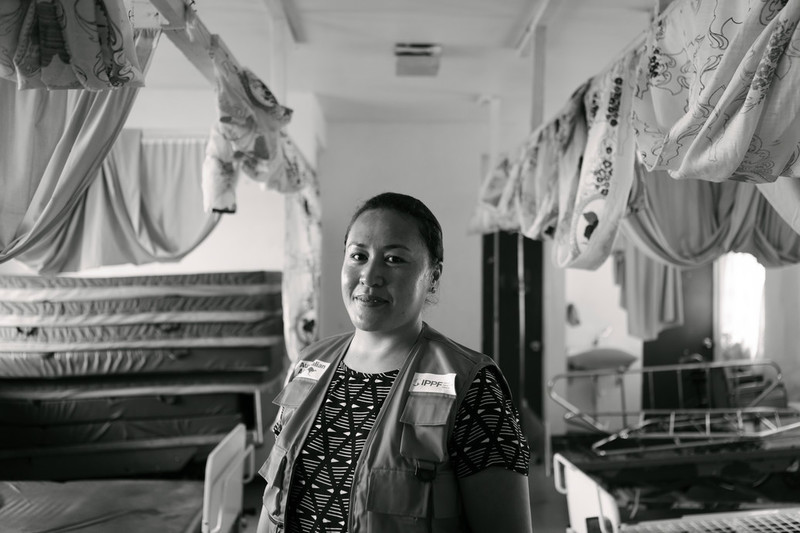
Emergency creates the opportunity to expand access to healthcare
In a crowded classroom on a Saturday morning in February, almost fifty reproductive health nurses gather to learn about detecting and responding to gender-based violence (GBV) in emergencies. It’s hard to fathom that only days ago, their tiny island Kingdom of Tonga was ravaged by Tropical Cyclone Gita. But they are here, and keen to learn. They will all be part of emergency outreach teams in Tonga; including the response by IPPF Member Association, the Tonga Family Health Association (TFHA). During an IPPF emergency response, teams of clinical staff go to the affected communities. This saves people time and money, two resources that quickly deplete after an emergency. The TFHA team will travel to communities affected by the cyclone to provide life-saving sexual and reproductive healthcare and information. Some island communities they will reach have never had consistent access to sexual and reproductive healthcare. This mobility and access to remote communities also provides an opportunity to scan for signs of gender-based violence. During a humanitarian crisis, many factors such as decreased protection mechanisms and increased instability exacerbate GBV-related risks, so it is vital to prevent, monitor and respond to cases of GBV. Another way the outreach teams access women is through the distribution of ‘dignity kits’: bags containing simple hygiene and protection items that help women maintain their dignity after a disaster. Katherine Mafi is the Programme Manager for TFHA. She says; “coming face to face with the recipient of a dignity kit is quite an experience, it's a magic moment watching these women.” “We don’t just preach information, but we have something. We have the solution. We have to offer something. You can't talk about maintaining dignity without the kits, and you can't just talk about the services without the services being present.” The TFHA teams see this as an opportunity to discuss contraception, STIs and HIV, and pap smears with women, in the privacy of their own homes. In a deeply religious and conservative country like Tonga, it isn’t always easy getting women to talk about sexual and reproductive health. Some women are reluctant, even, to get a pap smear. In a country where many women die from cervical cancer, this could be a deadly reluctance. Vika Finau, TFHA nurse and part of the emergency response team, talks about her experience encouraging women to have a pap smear in Tonga: “The challenge is encouraging them to come forward, they keep hesitating because of the procedure. They have to expose their genital area. Twenty women might agree to come for pap smear and at the end only nine or ten will come forward.” Once a woman is receiving a pap smear, however, Vika can gently broach the subject of sexual and reproductive health issues, and screen for signs of gender-based violence. It’s in this way that emergencies can create opportunities that wouldn’t have otherwise been there. IPPF’s emergency responses provide services, as well as information, often at the same time.
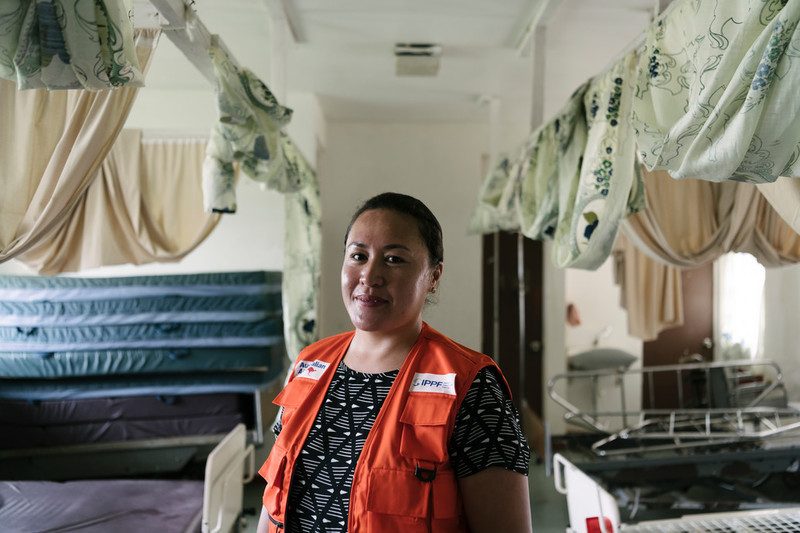
Humanitarian disaster in Tonga brings opportunity through access to healthcare
Following the devastation wrecked by Tropical Cyclone Gita on the island of Kingdon of Tonga, the Tonga Family Health Association deployed an emergency response team. The team was able to bring vital sexual and reproductive health care to local communities. By taking services to the people, the team has been able to expand the types of care that many women would not readily access including pap smears and the opportunity to raise awareness around gender-based violence. Combining service delivery, as well as information, is part of our tailored approach to humanitarian crises; ensuring we meet need, wherever it is, whoever requires it, for as long as they want it. Photography © IPPF/Alana Holmberg
Pagination
- Previous page
- Page 3
- Next page







